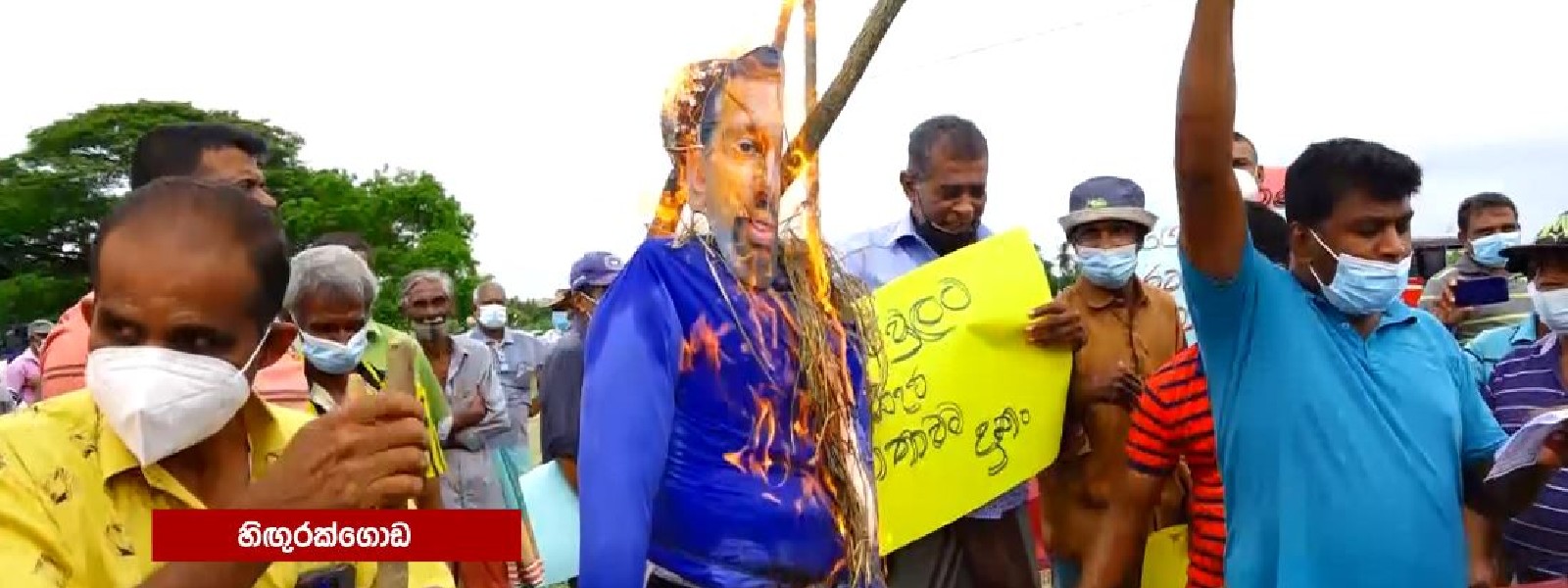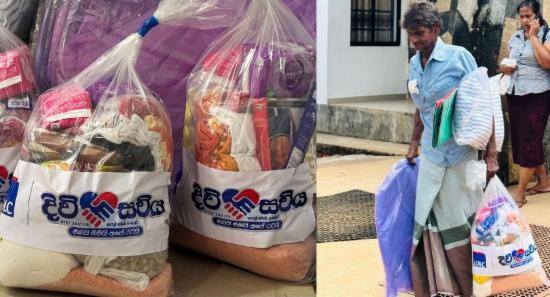.webp)

Fertilizer Crisis : Protests Intensify
COLOMBO (News 1st); Farmers across Sri Lanka have intensified their protests due to the lack of fertilizer and being compelled to abandon their farmlands.
In Minneriya, a township located in the North Central portion of Sri Lanka farmers set fire to an effigy depicting a government minister.
"If the government can take a step back on all other matters, why can't they do so with the fertilizer issue," said one farmer.
A similar situation was experienced in Girithale and Dehiaththakandiya, as well.
These farmers are demanding the government release fertilizer stocks for cultivation ahead of the upcoming harvesting season.
Several months ago, Sri Lanka banned the importation of chemical fertilizers in a bid to move towards organic farming.
For months, Farmers across many areas in Sri Lanka have been protesting against the shortage of fertilizer in the country.
The ban on chemical fertilisers — widely used in the tea and rice industries — was opposed by farmers who staged protests after reporting failing vegetable crops as existing stocks began to run out within weeks.
The promulgated regulation restricting and banning the import of fertilizers and agrochemicals is leading to widespread concern among Sri Lanka’s farmer community, industry associations, practitioners, and agricultural professionals.
The Sri Lankan Government has also decided only to use organic fertilizer in the country and plans on importing organic fertilizer from overseas.
Sri Lankan soil scientists, however, are raising concerns on the negative impact that organic fertilizer imports could have on the country’s agricultural area, especially the samples that tested for harmful bacteria.
On the 5th of October 2021, Sri Lanka’s Agriculture Minister Mahindananda Aluthgamage told Parliament that laboratory tests have confirmed that the Organic Fertilizer samples sent from India, are suitable to be used in the country.
He said National Plant Quarantine Service had given the green light for the Indian fertilizer.
The Minister said discussions were underway to import nano-nitrogen fertilizer from India and if there is a delay, a decision has been reached to import the fertilizer using aircraft.
He said previous samples from China had tested positive for the presence of the Erwinia Bacteria, which is harmful to certain cultivations in the country.
The Agriculture Minister assured that the suspension of Chinese Organic Fertilizer will not impact the harvesting seasons in the country.
He said on the 12th of October the necessary fertilizer will be released for the Maha Season cultivation.
On the 3rd of October 2021, Sri Lanka’s Agriculture Minister said that Qingdao Seawin Biotech Group Co., Ltd., a Chinese Organic Fertilizer Company, will be sending a fresh batch of fertilizer to Sri Lanka after a harmful pathogen was detected in samples.
‘The Chinese firm admitted their mistake and have assured us that they will rectify it,’ said Mahindananda Aluthgamage.
On September 29th, Sri Lanka’s Agriculture Minister Mahindananda Aluthgamage announced the suspension of organic fertilizer imports from China.
According to the Agriculture Ministry, this decision was reached after laboratory tests revealed the presence of harmful bacteria in the organic fertilizer samples.
Harmful Bacteria was detected in a fresh sample of Chinese Organic Fertilizer, said the Director-General of Agriculture Dr. Ajantha De Silva on 28th September.
This supplier was revealed as Qingdao Seawin Biotech Group Co., Ltd.
On the 17th of September Sri Lanka’s Minister of Agriculture confirmed for the first time that a microorganism identified as ‘Erwinia’ was discovered in samples brought down ‘unofficially’ to Sri Lanka and tested.
The supplier was the same, Qingdao Seawin Biotech Group Co., Ltd.
However, on the 10th of October, the Chinese Embassy said the comments noting that Erwinia was found in the samples from Qingdao Seawin Biotech Group Co., Ltd. has no scientific basis.
The statement adds that according to the International Plant Protection Convention it takes 6 days to identify the presence of the bacteria Erwinia, but the National Plant Quarantine Service in Sri Lanka claims to have detected the bacteria within just 3 days.
In response the National Plant quarantine service said that the samples of fertilizer brought down from China were tested on a number of occasions and that the tests were not conducted only for 3 days.
Other Articles
Featured News





.png )

-820480_550x300.jpg)








-819380_550x300.jpg)


-812087_550x300.jpg)
-810262_550x300.jpg)
















.gif)